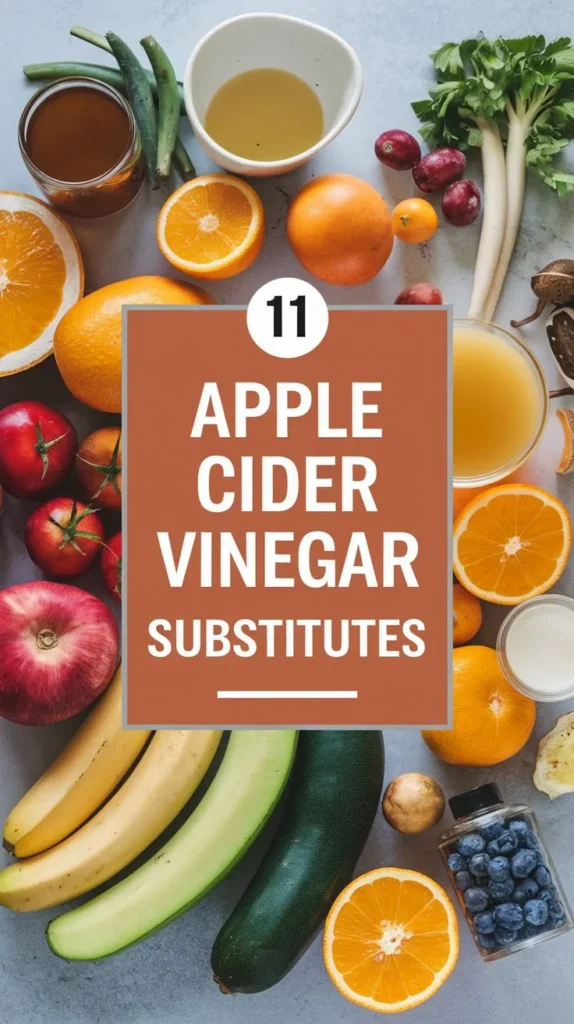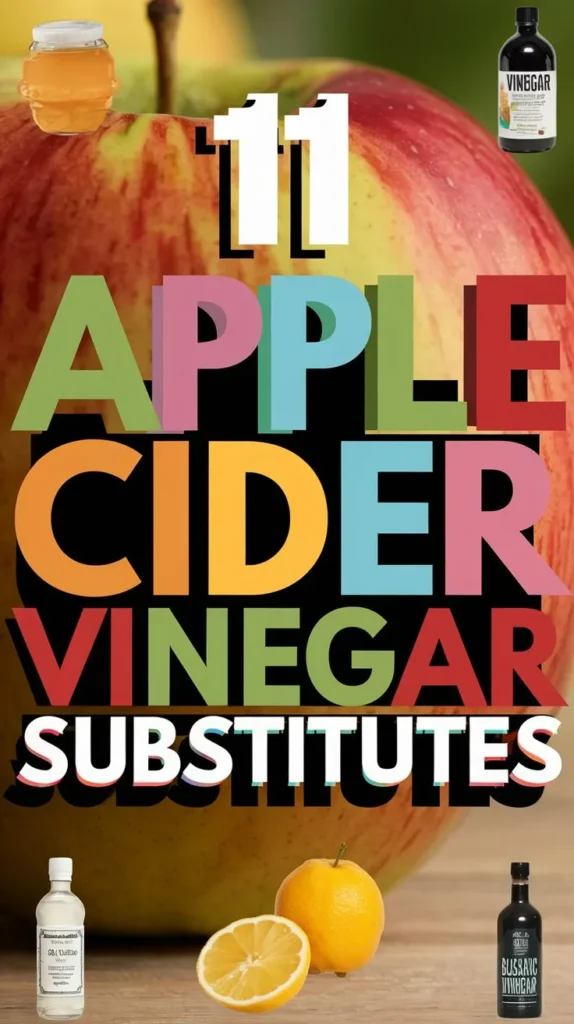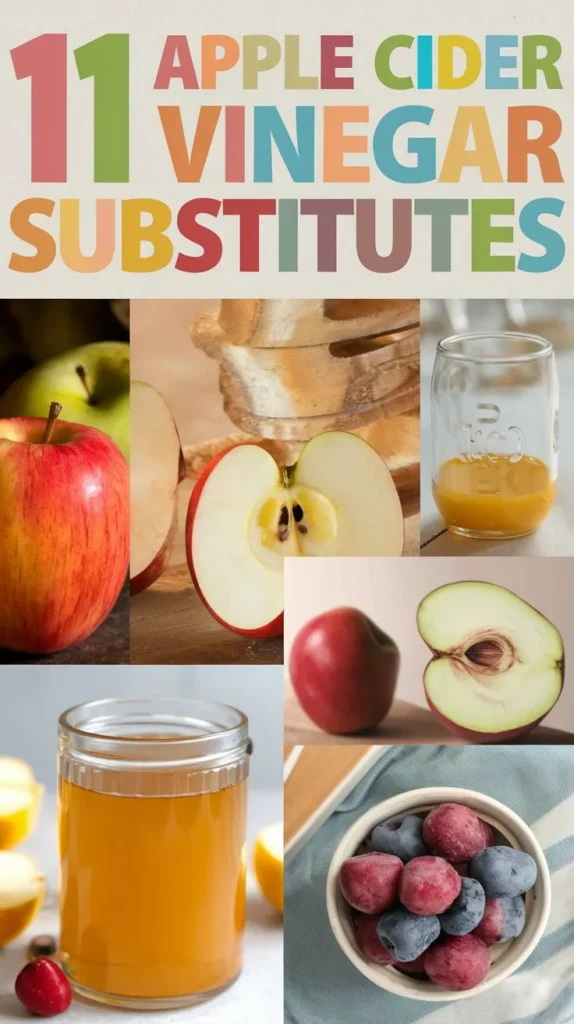11 Apple Cider Vinegar Substitutes for a Tangy, Fruity Flavor
You’re in the middle of cooking a recipe that calls for apple cider vinegar, but you’re out – what now? Don’t let it ruin your dish! You’re about to discover 11 surprising substitutes that’ll give you that tangy, fruity flavor you’re looking for.
From balsamic vinegar’s rich flavor to citrusy lemon and lime juice, and even a yogurt and honey combo, these alternatives will save the day.
But which one will work best for your recipe? You’ll need to explore these options further to find the perfect replacement.
At a Glance
- Balsamic vinegar is a suitable substitute for apple cider vinegar in marinades, dressings, and sauces, but has a sweeter and stronger flavor profile.
- White wine vinegar provides a subtle tanginess and can be used in smaller amounts due to its higher acidity level.
- Malt vinegar has a distinct, rich flavor and can be used in smaller amounts, with a general ratio of 1 part malt to 2 parts apple cider vinegar.
- Fruit-based substitutes like grape juice reduction and pomegranate molasses offer a sweet and tangy flavor profile, making them excellent alternatives to apple cider vinegar.
- Other substitutes like rice vinegar, yogurt and honey combo, and citrus juices like lemon and lime can also provide a tangy and fruity flavor in recipes.

Balsamic Vinegar Alternative
When you’re in a pinch and apple cider vinegar isn’t available, balsamic vinegar can be a decent alternative in many recipes.
However, keep in mind that balsamic vinegar has a stronger, sweeter flavor profile compared to apple cider vinegar, which may impact the overall taste of your dish. This sweetness can work well in marinades, dressings, and sauces, but may not be suitable for recipes where a tangier flavor is desired.
The acidity level of balsamic vinegar is also higher than apple cider vinegar, which can affect the balance of flavors in your recipe.
To compensate, you may need to adjust the amount of vinegar used or add other ingredients to counterbalance the acidity.
Despite these differences, balsamic vinegar can still be a good substitute in a pinch, especially if you’re looking for a more robust flavor. Just be prepared to make some adjustments to get the flavor profile you’re aiming for.
White Wine Vinegar Option
Your pantry’s white wine vinegar can be a suitable stand-in for apple cider vinegar in many recipes, especially those where a lighter flavor is desired.
This vinegar has a more delicate flavor profile compared to apple cider vinegar, which makes it an excellent choice for dishes that require a subtle tanginess.
White wine vinegar’s acidity level is slightly higher than apple cider vinegar, so you may want to use it in smaller amounts to avoid overpowering your dish.
When substituting white wine vinegar for apple cider vinegar, keep in mind that it will change the overall flavor profile of your recipe.
White wine vinegar has a crisp, dry taste with hints of fruitiness, whereas apple cider vinegar has a sweeter, fruitier flavor.
However, this substitution works well in recipes like salad dressings, marinades, and sauces where a lighter flavor is desired.
Remember to taste and adjust as you go, adding more or less vinegar to achieve the perfect balance of flavors in your dish.
With its mild flavor and suitable acidity level, white wine vinegar can be a reliable substitute for apple cider vinegar in many recipes.
Malt Vinegar Substitution
In place of apple cider vinegar, you can turn to malt vinegar as a substitute, particularly in recipes that require a stronger, more robust flavor profile.
Malt vinegar has a distinct, rich flavor profile that works well in dishes like marinades, sauces, and braising liquids.
When substituting malt vinegar for apple cider vinegar, keep in mind that malt vinegar has a stronger, more pronounced flavor, so you may want to start with a smaller amount and adjust to taste.
A general vinegar ratio to follow is 1 part malt vinegar to 2 parts apple cider vinegar.
This will help you achieve a similar level of acidity while still capturing the unique malt flavor profile.
In some cases, you may need to adjust the ratio based on the specific recipe and your personal taste preferences.
White Distilled Vinegar
One key benefit of using white distilled vinegar as a substitute for apple cider vinegar is its neutral flavor profile, which won’t overpower the other ingredients in your recipe.
This is particularly useful when you want to add a tangy flavor without altering the overall taste of your dish. With a history dating back to the 18th century, white distilled vinegar has been a staple in many kitchens, and its versatility makes it an excellent substitute in many recipes.
When it comes to flavor profiles, white distilled vinegar is a great option because it won’t add any fruity or sweet notes to your dish.
Instead, it will provide a clean, crisp flavor that will enhance the other ingredients in your recipe. This makes it an excellent choice for dishes where you want a subtle tanginess without overpowering the other flavors.
Additionally, white distilled vinegar is often cheaper than apple cider vinegar, making it a more affordable option for those on a budget.
Lemon Juice and Zest
Using lemon juice and zest as a substitute for apple cider vinegar is a clever trick that can add a bright, citrusy flavor to your dishes.
When you’re looking for a citrus burst flavor, lemon juice is an excellent option. This is particularly useful in recipes where you want a fresh, tangy taste without the sweetness of apple cider vinegar.
Start by substituting one tablespoon of lemon juice for one tablespoon of apple cider vinegar. You can adjust the amount to your taste, but keep in mind that lemon juice is more acidic, so you may need less of it.
Adding lemon zest to your dish can also enhance the flavor profile.
The zest contains oils that are released when grated, which add a subtle citrus flavor to your food. Use a microplane or fine grater to zest the lemon, and then mix it with the juice or add it to your recipe separately.
Remember that lemon juice and zest will give your dish a different flavor profile than apple cider vinegar, so crucial to taste as you go and adjust the seasoning accordingly.
Rice Vinegar Flavor Boost
Beyond the brightness of lemon juice and zest, rice vinegar offers a distinct flavor profile that can substitute for apple cider vinegar in many recipes.
You’ll find that rice vinegar has a mild, slightly sweet flavor with a hint of fermented flavor that works well in marinades, salad dressings, and sauces. Its subtle taste won’t overpower other ingredients, making it an excellent choice for dishes where you want a delicate balance of flavors.
Rice vinegar is a staple in Asian cuisine, particularly in Chinese, Japanese, and Korean cooking.
It’s often used to add depth and complexity to stir-fries, noodles, and braises. When substituting rice vinegar for apple cider vinegar, keep in mind that it has a milder flavor, so you may want to use a bit more to achieve the desired taste.
Start with a small amount and adjust to taste, as you can always add more but can’t remove excess vinegar from a dish. With its unique flavor profile and versatility, rice vinegar is an excellent addition to your pantry when looking for an apple cider vinegar substitute.
Grape Juice Reduction
While you may not immediately think of grape juice as a substitute for apple cider vinegar, a grape juice reduction can actually provide a similar sweet and tangy flavor profile.
By cooking down grape juice, you’ll end up with a thick, syrupy liquid that’s packed with flavor. This reduction can add a fruit syrup sweetness to your dishes, making it an excellent alternative to apple cider vinegar in many recipes.
The key to making a great grape juice reduction is to cook the juice slowly over low heat, allowing the water to evaporate and the flavors to concentrate.
This process can take some time, but the result is well worth the effort. The resulting liquid will have a rich, juice concentrate richness that’s perfect for adding depth to marinades, sauces, and salad dressings.
When using grape juice reduction as a substitute for apple cider vinegar, start with a small amount and taste as you go, adjusting the seasoning to your liking.
With its sweet and tangy flavor, grape juice reduction is a versatile ingredient that’s sure to become a staple in your pantry.
Pomegranate Molasses Twist
Pomegranate molasses adds a fruity and tangy twist to your dishes, much like grape juice reduction.
You’ll love how it elevates your recipes with its rich, fruity flavor and sweet acidity balance. In your fruit syrup exploration, pomegranate molasses stands out for its bold, intense taste.
When used as an apple cider vinegar substitute, it brings a unique dimension to marinades, salad dressings, and sauces.
You can use pomegranate molasses in place of apple cider vinegar in many recipes, especially those where you want a sweeter, fruitier flavor.
Try it in BBQ sauces, glazes, or braising liquids for a depth of flavor that’s hard to beat. With its thick, syrupy consistency, pomegranate molasses is also great for adding body to sauces and dressings.
Experiment with different ratios to find the perfect balance of sweet and tangy for your taste buds. As you explore the world of fruit syrups, pomegranate molasses is definitely worth trying – it might just become your new go-to substitute for apple cider vinegar!
Lime Juice and Zest
Experiment with the bright, citrusy flavor of lime juice and zest as a substitute for apple cider vinegar in your recipes.
You’ll be surprised at how the fresh lime flavor can add a citrus burst to your dishes. When using lime juice and zest, keep in mind that they’ve a stronger flavor than apple cider vinegar, so start with a small amount and adjust to taste.
- Marinades and Sauces: Use lime juice and zest to add a tangy, fruity flavor to your marinades and sauces. It pairs well with grilled meats, seafood, and vegetables.
- Salad Dressings: Replace apple cider vinegar with lime juice and zest in your salad dressings for a revitalizing twist.
- Roasted Vegetables: Add a squeeze of fresh lime juice and a sprinkle of zest to your roasted vegetables for a burst of citrus flavor.
Sherry Vinegar Substitute
You’re likely familiar with the rich, nutty flavor of sherry vinegar, but if you don’t have it on hand, don’t worry!
When exploring the flavor profile of sherry vinegar, you’ll find it’s often used to add depth and complexity to dishes.
If you’re looking for a substitute, balsamic vinegar is a great option. With its sweet-and-sour taste and rich, fruity aroma, it can mimic the flavor profile of sherry vinegar in many recipes.
When using balsamic vinegar as a substitute, keep in mind it’s slightly sweeter than sherry vinegar, so you may want to reduce the amount used or balance it with other ingredients.
For pairing suggestion analysis, try using balsamic vinegar in salad dressings, marinades, or as a finishing touch for soups and stews.
Its fruity flavor will complement sweet ingredients like figs or grapes, while its acidity will cut through rich meats like pork or lamb.
Yogurt and Honey Combo
Your kitchen’s repertoire of flavor enhancers mightn’t always include apple cider vinegar, but that’s okay.
You can still achieve that tangy, fruity flavor with a yogurt and honey combo. This substitute is perfect for those who want to add a touch of sweetness to balance out the acidity.
Here’s how you can use this combo in your recipes:
1. Tangy Parfait: Mix yogurt with honey and a pinch of salt to create a sweet and tangy sauce.
Layer it with fresh fruits, granola, and nuts for a healthy and delicious snack.
2. Honey Glaze: Combine yogurt with honey and a squeeze of lemon juice to create a sweet and sticky glaze.
Brush it over grilled meats, poultry, or vegetables for a caramelized finish.
3. Dressing and Marinades: Use yogurt and honey as a base for salad dressings, marinades, and sauces.
Add herbs, spices, and other flavorings to create a unique taste experience.
This combo is versatile and can be adjusted to suit your taste preferences.
Experiment with different ratios of yogurt to honey to find the perfect balance of tangy and sweet.
FAQs
Can I Use Apple Cider Vinegar Substitutes in Baking Recipes?
When swapping apple cider vinegar in baking recipes, you’ll need to ponder baking conversions and flavor profiles. You can substitute with other acidic ingredients, but be mindful of the tangy flavor’s impact on your final product’s taste and texture.
Do Apple Cider Vinegar Substitutes Have Similar Health Benefits?
You’re wondering if apple cider vinegar substitutes offer similar health benefits? While they may mimic the flavor profiles, their health properties vary; some, like balsamic vinegar, have antioxidant-rich compounds, but others might lack the same probiotic benefits, so choose wisely.
Can I Mix and Match Different Vinegar Substitutes for Unique Flavors?
You can experiment with mixing and matching different vinegar substitutes to create unique flavor profiles, blending notes of sweet, sour, and tangy to craft your perfect taste, and revealing new depths in your cooking through vinegar blending.
Are There Any Apple Cider Vinegar Substitutes Suitable for Vegans?
You’ll be happy to know that there are vegan-friendly alternatives to apple cider vinegar, such as coconut vinegar, date vinegar, and even berry-infused vinegars, offering delicious plant-based options that cater to your lifestyle and dietary needs.
Can I Store Homemade Apple Cider Vinegar Substitute Blends Long-Term?
When storing your homemade blends, you’ll want to guarantee they’re airtight and refrigerated to extend shelf life; regularly check for signs of spoilage like off smells or mold, and use your best judgment to determine if it’s still good to use.











DK Jacks is a passionate food enthusiast, recipe developer, and culinary explorer. With a love for both traditional and innovative flavors, DK brings a fresh perspective to the kitchen. When not experimenting with new ingredients, you’ll find DK capturing food moments through the lens or sharing cooking tips with fellow foodies.🍽️📸✨






